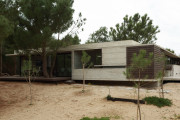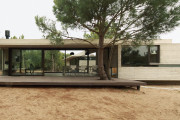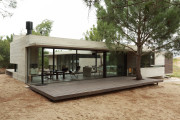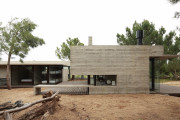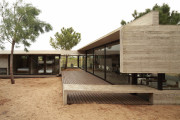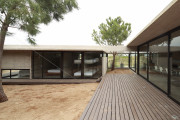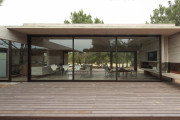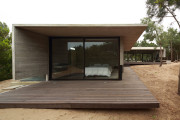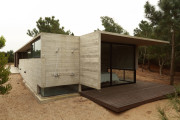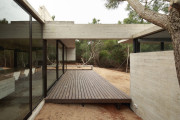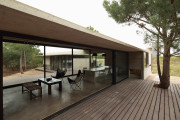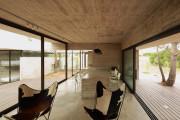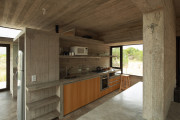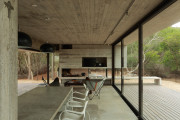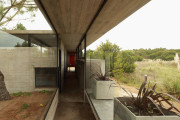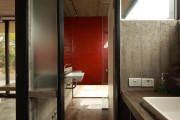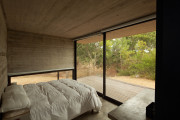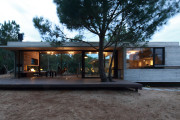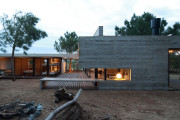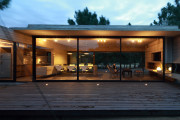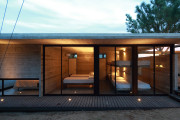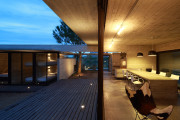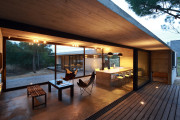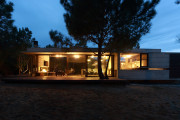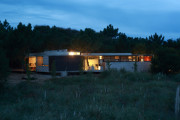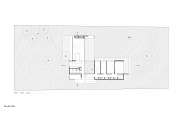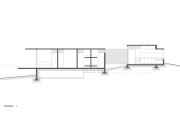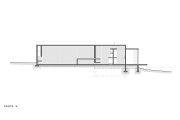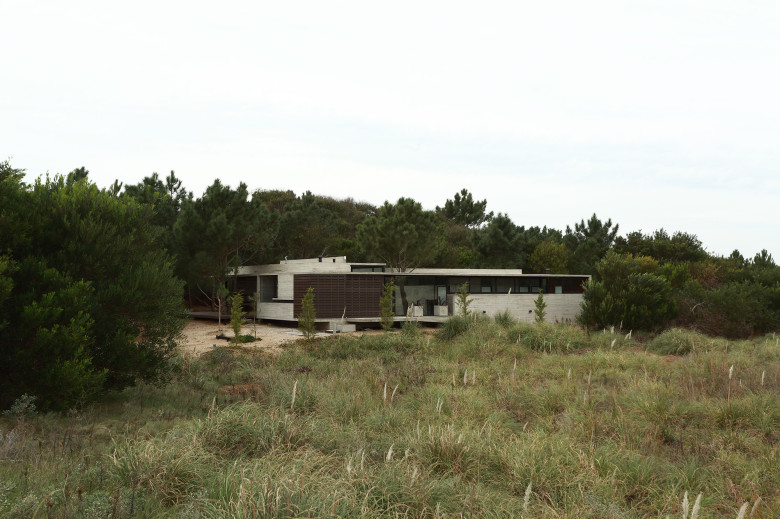Carassale House
Location: Costa Esmeralda, Buenos Aires Province, Argentina
Design and Project Management: María Victoria Besonías, Luciano Kruk
Collaborators: Ekaterina Allaria
Land area: 1024 sqm
Built area: 163 sqm
Construction year: 2012
Photos: Gustavo Sosa Pinilla
MEMORY
María Victoria Besonías
The place
Costa Esmeralda is a private venture on the dunes of the coast of Buenos Aires, 390 km from the city of Buenos Aires. This is a recent development with a young acacia and pine trees afforestation with a few consolidated forest sectors.
The batch to intervene is at the edge of a zone of young vegetation. It is located between a higher area with a dense plantation to the left, and a low area to the right, with no vegetation sown and abundant pastures of the region.
Specifically, the land has some acacias and only nine young maritime pines-mostly clustered near the front line, one in the center and one in the background, so the project begins with the premise of preserving all existing trees.
The commission
This was a very particular request, as one member of the couple who contacts the studio is an architect that, being unable to take care of the project due to time and distance, turns to colleagues with whom she shares architectural criteria.
In the first interview they say that, although the family is composed by the couple plus three small children, the idea is to have many places to sleep since they plan to share the house with friends over long stays. For the same reason, the social area also had to be generously sized. Therefore it was suggested to solve some bedrooms as cabins, as the house could not exceed 150 or 160 m2. The gathering place will integrate the kitchen and have a fireplace which should enable barbecuing, when impossible to do it outside. It should also have an outdoor grill, expansion places and a place to be used as a laundry room and warehousing for beach items.
Was also highlighted the need to have a very fluid relationship with the outside in all rooms. The formalization of the house would have to be austere and of very low impact in this rough environment, highly appreciated by the clients.
The proposal
It was decided to locate the house in the central area of the property – the highest and with just one tree to integrate- solving it into two mutually perpendicular volumes intersected at different heights, following the contours of the lot, separated at the junction to let in a young maritime pine that over time will become the main character.
The first volume is an elongated prism, parallel to the street and open at both main sides producing a semi covered which integrates the grove of trees located in the front with the rest of the batch. The second, another elongated prism located three steps below to fit the contour of the lot, houses four bedroom and resolves two clearly differentiated facades: the western, closed, corresponds to the circulation and shared bathroom, and the eastern, open, with large windows allowing the integration of the three bedrooms with the outside. The last bedroom, the main, opens to the backyard with an important semi covered space and a private terrace protected from the view of the rest of the house and overlooking a rugged landscape that will not vary over time because there are no neighbors adjoining the back of the property.
Carassale House
Location: Costa Esmeralda, Buenos Aires Province, Argentina
Design and Project Management: María Victoria Besonías, Luciano Kruk
Collaborators: Ekaterina Allaria
Land area: 1024 sqm
Built area: 163 sqm
Construction year: 2012
Photos: Gustavo Sosa Pinilla
MEMORY
María Victoria Besonías
The place
Costa Esmeralda is a private venture on the dunes of the coast of Buenos Aires, 390 km from the city of Buenos Aires. This is a recent development with a young acacia and pine trees afforestation with a few consolidated forest sectors.
The batch to intervene is at the edge of a zone of young vegetation. It is located between a higher area with a dense plantation to the left, and a low area to the right, with no vegetation sown and abundant pastures of the region.
Specifically, the land has some acacias and only nine young maritime pines-mostly clustered near the front line, one in the center and one in the background, so the project begins with the premise of preserving all existing trees.
The commission
This was a very particular request, as one member of the couple who contacts the studio is an architect that, being unable to take care of the project due to time and distance, turns to colleagues with whom she shares architectural criteria.
In the first interview they say that, although the family is composed by the couple plus three small children, the idea is to have many places to sleep since they plan to share the house with friends over long stays. For the same reason, the social area also had to be generously sized. Therefore it was suggested to solve some bedrooms as cabins, as the house could not exceed 150 or 160 m2. The gathering place will integrate the kitchen and have a fireplace which should enable barbecuing, when impossible to do it outside. It should also have an outdoor grill, expansion places and a place to be used as a laundry room and warehousing for beach items.
Was also highlighted the need to have a very fluid relationship with the outside in all rooms. The formalization of the house would have to be austere and of very low impact in this rough environment, highly appreciated by the clients.
The proposal
It was decided to locate the house in the central area of the property – the highest and with just one tree to integrate- solving it into two mutually perpendicular volumes intersected at different heights, following the contours of the lot, separated at the junction to let in a young maritime pine that over time will become the main character.
The first volume is an elongated prism, parallel to the street and open at both main sides producing a semi covered which integrates the grove of trees located in the front with the rest of the batch. The second, another elongated prism located three steps below to fit the contour of the lot, houses four bedroom and resolves two clearly differentiated facades: the western, closed, corresponds to the circulation and shared bathroom, and the eastern, open, with large windows allowing the integration of the three bedrooms with the outside. The last bedroom, the main, opens to the backyard with an important semi covered space and a private terrace protected from the view of the rest of the house and overlooking a rugged landscape that will not vary over time because there are no neighbors adjoining the back of the property.

